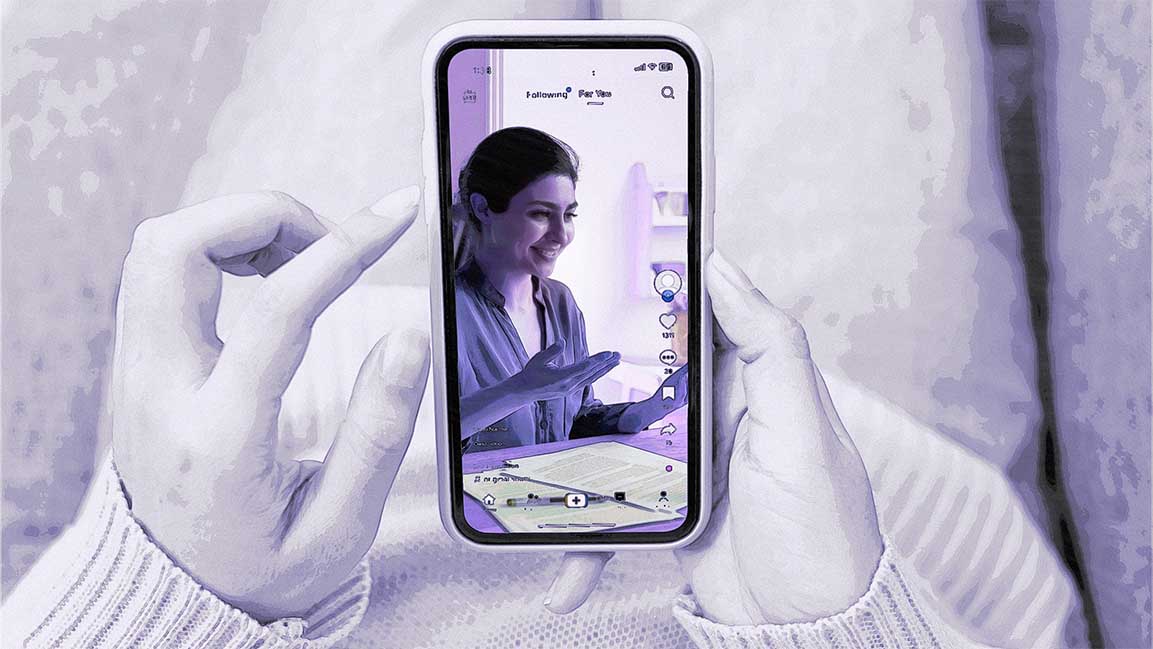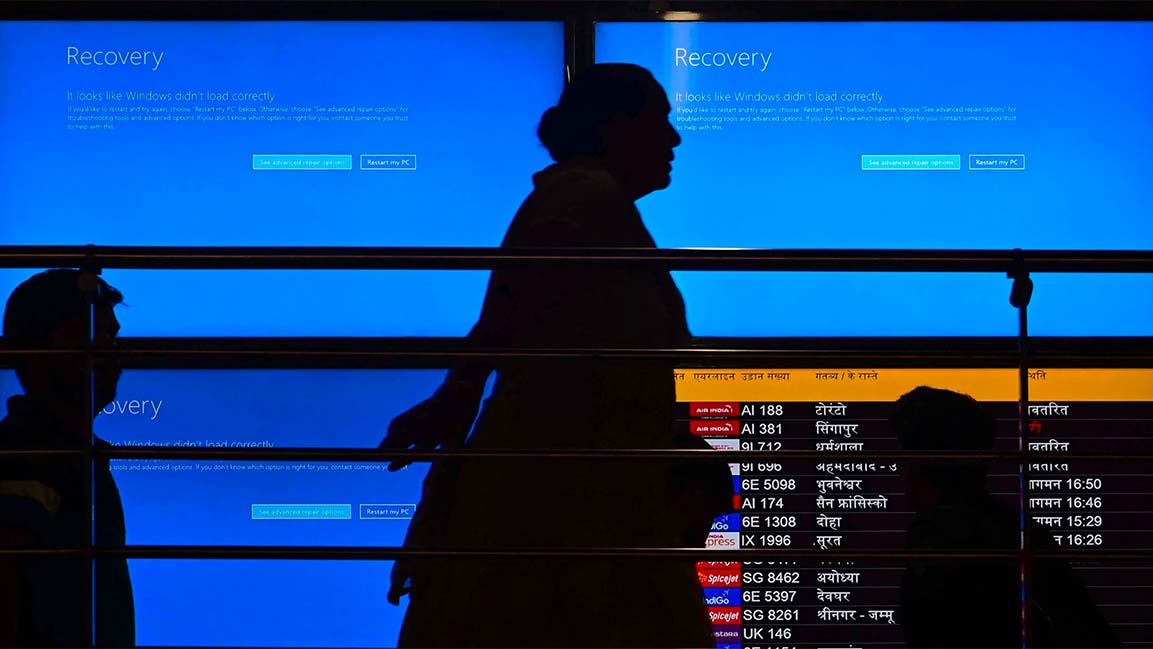- | 9:00 am
Patients in the Middle East are getting medical advice from social media. And it may not be all that bad
In the absence of timely and satisfactory healthcare, women turn to social for a health diagnosis.

Jenna Blake, a nursing practitioner, was diagnosed with polycystic ovary syndrome (PCOS) — a hormonal disorder that affects 4-20% of reproductive women worldwide, with symptoms ranging from fatigue, depression, and weight gain to infertility — in her teens. Feeling lost, Blake struggled for years to find answers on her own.
Once she saw how prevalent PCOS is, she realized a big gap in the women’s health field that needed to be addressed. Transitioning from traditional practice to women’s health, Blake started Her Rooted Wellness, an online business that offers programs to rebalance hormones and gut health.
She explains that the most common reason women seek out her support is for imbalanced hormones, like a painful menstrual cycle, inability to lose weight, gut health issues, chronic stress, fatigue, and blood sugar imbalances.
“When I set out, my goal was to create a safe and welcoming place where women could feel seen, heard, understood, and validated in their health journey,” she says.
Like most online businesses, she shares content on TikTok and Instagram. “It’s my goal to make this sort of information accessible to as many women as possible, so I started producing educational videos on social media.”
A GAP IN TRADITIONAL HEALTHCARE SYSTEMS
Globally, women’s healthcare has been underserved by traditional practice for several reasons. Men and women are affected differently by a condition. For example, women face additional symptoms of fainting, hallucinations, and seizures when experiencing a stroke.
Amanda Shea, head of science at Clue, a menstrual tracking app, highlights that women are also less likely to be given treatment for their pain and are more likely to have to wait longer for pain medication.
With conditions like severe premenstrual symptoms, the pain is further dismissed as a normal part of being a woman.
In the Middle East, reproductive health and well-being are still taboo and may not be discussed openly. A 2014 study found that Saudi women experiencing heart issues delay a pre-hospital visit because of socio-cultural reasons like prioritizing household duties over their health.
Broken healthcare systems – with long wait times, lack of specialists, and high medical costs – are another reason women might not receive timely care. For example, endometriosis, a chronic uterine condition, takes an average of eight years to be diagnosed.
While more attention is shifting to women’s health needs, Shea notes that myths and taboos are still pervasive when it comes to menstrual and reproductive health, and we still have a long way to go before healthcare for women is on par with men.
TURNING TO SOCIAL MEDIA FOR A SOLUTION
It’s hardly surprising that women are turning to social media to seek answers to their problems. “People can receive information immediately, in a more accessible and interesting way,” Shea says. “It also provides an opportunity to learn in a comfortable environment where they can avoid discomfort and shame that may be felt in other settings.”
TikTok and Instagram – thanks to their short, digestible video component – are popular platforms for this type of content. A quick search on TikTok reveals many videos on conditions ranging from PMS relief and hormonal imbalances to gut health. For example, a video on breakfast for balancing hormones has racked up 2.3 million views.
Blake adds that the biggest benefit to women is the validation alone.
“The realization that they’re not crazy and that other people experience the same symptoms. And that there is not only an explanation for their symptoms but also a way to fix them.”
“Unfortunately, women are so often gaslit and dismissed in the traditional medicine model that social media has become a haven to begin unpacking these experiences and exploring other options.”
WHERE DO YOU DRAW THE LINE?
While there are benefits to having this information accessible, there is also a lot of incorrect and misleading information to sift through. “This can prevent people from getting a real diagnosis and even cause more harm,” Shea says. There’s also no way to verify the source of information, as anyone can share their opinion.
It’s common to see people taking magnesium supplements or following a gluten-free diet because an influencer propagated a lifestyle change.
On the traditional healthcare side, Ali Hashemi, co-founder of GluCare.Health, a specialty endocrinology clinic in Dubai, notes that they have seen numerous cases of patients coming in with incorrect or misleading information obtained from social media.
Shea also notes that it’s an opportunity for predatory individuals and companies to take advantage of women’s concerns by selling unnecessary products that don’t work at best or cause greater harm.
Tracy Beckerman, a registered dietitian who goes by The Happiest Nutritionist on Instagram, provides nutrition-based coaching services for issues like infertility, period health, and pregnancy. When asked if health influencers dilute the authenticity behind their services, she says one should be wary of influencers or coaches constantly looking to push products, link products, or brag about their diet or supplement choices.
“It’s best to think that they benefit from these boasts and nudges rather than wholeheartedly wanting to share with the world. That’s just the new world we live in.”
USE SOCIAL MEDIA TO BETTER ADVOCATE FOR YOURSELF
Beckerman advises women to do their research, vet the source of information, and look up the credentials of the health influencer. “The advice that gets put into the world of social media is not intended for you, it’s intended for the masses.”
Shea also notes that while online health information is helpful, everyone has a different medical and family history.
She advises women to collect as much information as possible on their health-related experiences. “Coming armed to an appointment with a record of your detailed experiences and how they have changed (or not) over time can give you the confidence to communicate your issue to your healthcare providers and help reach an accurate diagnosis sooner.”
While it can be challenging if you haven’t had a good experience with your healthcare provider or feel that your doctor isn’t taking your concerns seriously, Shea advises women not to be afraid to advocate for themselves.
“Keep in mind that no one knows your body or experiences as well as you do, so don’t be afraid to advocate for yourself until you are heard.”
This can mean getting a second opinion, bringing along a family member to help advocate for you and offer support, or searching for a specialist who hears and understands your situation.








































